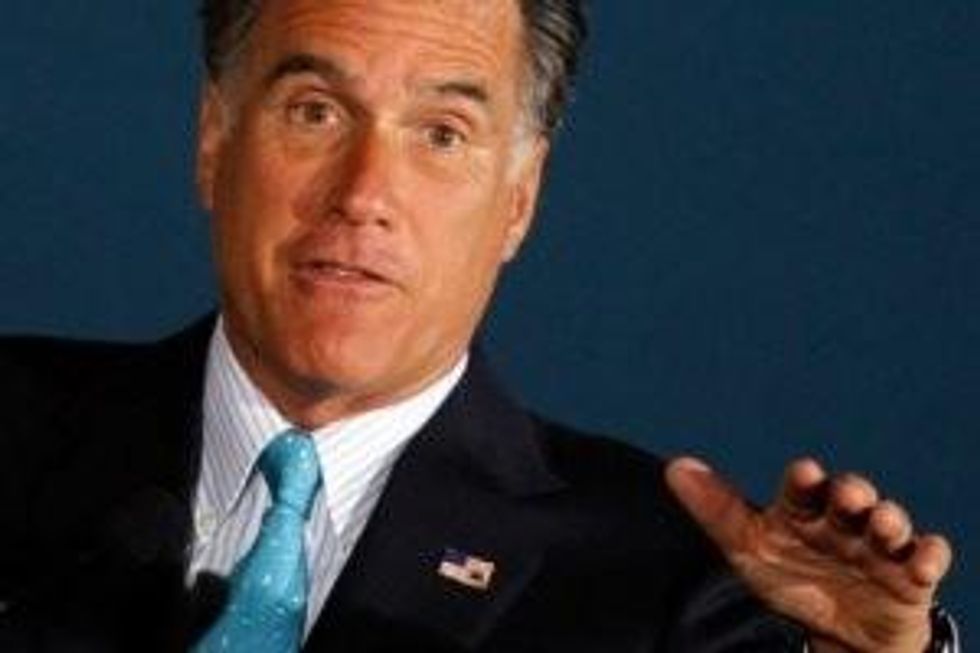I'll be honest: There are a few things about Mitt Romney that I find annoying. One of the biggest has to be that there is probably no sentence he has repeated more often in this campaign than "I know how the economy works," but he never actually explains what he knows that nobody else does, or how that hard-won knowledge translates into a unique set of policy moves that only he could bring about and that would pull America from its economic doldrums.
There are really two sets of questions that absolutely must be asked of Romney in the area of economics, given the rationale he offers for his candidacy. The first is, "What specifically did you learn as a businessman that policymakers haven't known up until now?" As far as I know, he has only been asked this question once, and the result wasn't encouraging. (After repeating over and over that he "understands how the economy works," Romney finally allowed that businesses spend money on energy, so if energy were cheaper, they'd have more money. Brilliant, I know.) The second question that Romney needs to be asked is, "What are you proposing to do, and how is that different than what we've done before?"
The natural way to ask this is the way Brian Williams asked it in an interview with Romney yesterday: "The major planks of your job plan, lower taxes, both corporate and marginal rates, and reduce regulation. Explain how that would be different from what George W. Bush tried to push through?" Republicans might say this is a "gotcha" question, since it brings up George W. Bush, whom today's Republicans like to pretend was not actually president for eight years. But it's a reasonable way to ask, since Bush's presidency was pretty recent, and he did in fact implement the entire Republican economic agenda, with the exception of drastic cuts in the size of government, though that's something Republicans are committed to in rhetoric only. So how did Romney respond?
Well, let me describe--actually, there are five things that I believe are necessary to get this economy going. One, take advantage of our energy resources, particularly natural gas, but also coal, oil, nuclear, renewables. That's number one. A huge opportunity for us, and doing so is gonna bring manufacturing back, because low-cost, plentiful energy is key to manufacturing, in many industries.
Number two, trade. I want tre- to dramatically increase trade and particularly with--with Latin America. Number three, take action to get America on track to have a balanced budget. Now those three things, by the way, are things which we have not been doing over the last few years, which I think are essential to getting this economy going again.
Number four, we've got to show better training and education opportunities for our current re- workers and for coming workers. And then finally what I call restoring economic freedom. That means keep our taxes as low as possible, have regulations modern and up to date, get health care costs down. These things will restore economic freedom.
So my policies are very different than anything you've seen in the past. They're really designed for an America which has some new resources, energy being one of them, trade with Latin America being another, and the need for a balanced budget now more urgent than ever before.
To review: The way Mitt Romney's economic plan differs from what George W. Bush did is that Romney favors exploiting energy resources, free trade, having a good education system, balancing the budget (something every candidate in both parties says they'll do, but only Bill Clinton actually did), tax cuts, and less regulation. In short, Romney's program is exactly the same as what George W. Bush did. Yet Romney says, "My policies are very different than anything you've seen in the past." Right.
It isn't necessary that every presidential candidate come up with a set of policies that are absolutely new and unique. After all, politicians are largely creatures of their parties, and those parties have relatively consistent agendas, so no party nominee is going to offer an agenda that's unlike anything we've seen before. But Romney is presenting a case for his candidacy that is an unusual synthesis of the personal and the policy. Other candidates have centered their candidacies on a personal argument--Bush was a "different kind of Republican" who would deliver us from the bitter partisanship of the 1990s, Obama was the embodiment of hope and change--but Romney's two-fold claim is that the election is all about the practical problem of improving the economy and that because of who he is, but not because of what he wants to do, only he can solve that practical problem. When he's forced to get specific, his solution to the practical problem is the standard Republican agenda.
It's entirely possible that this argument, hollow though it is, could work. Polls seem to indicate that Romney has an advantage on which candidate voters believe would do a better job managing the economy, which is not the same as them thinking all we need to do is cut taxes for the wealthy and remove regulatory constraints on corporations. Indeed, the appropriate follow-up to the question Williams asked is, "George W. Bush did just about everything you're proposing to do. If it didn't work then, why is it going to work now?" But nobody has asked Romney that either, so the most advantageous thing for him to do is to keep repeating "I understand how the economy works" and hope he doesn't have to answer too many questions about what he actually wants to do.


